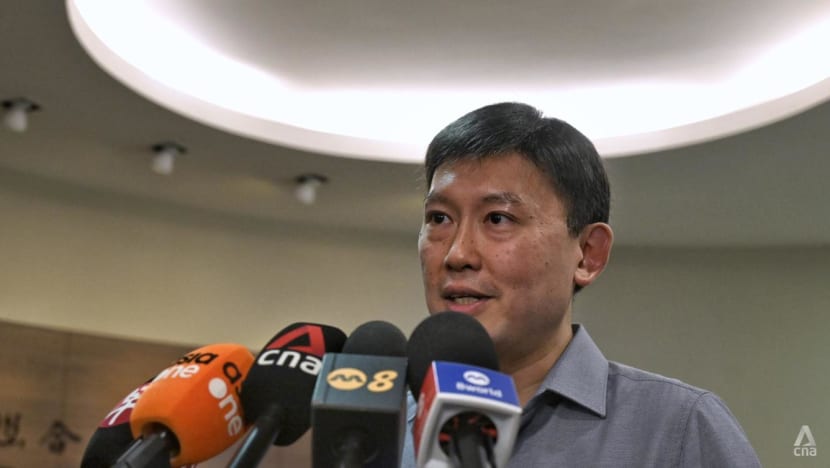About 100 young Chinese community leaders to be identified, nurtured over next 5 years through new programme
The Chinese Community Leadership Course is meant for those in their 30s and 40s who are active in the Chinese community and have a passion to serve.

Minister for National Development Chee Hong Tat speaks to the media at the Singapore Federation of Chinese Clan Associations on Aug 20, 2025. (Photo: CNA/Wallace Woon)

This audio is generated by an AI tool.
SINGAPORE: Amid worries about succession in Chinese community organisations, these groups will work with the government to identify and nurture the next generation of community leaders.
Over the next five years, the new Chinese Community Leadership Course will aim to identify and develop about 100 young leaders in their 30s and 40s, the government's Chinese Community Liaison Group (CCLG) said on Wednesday (Aug 20).
The programme will be developed by the Singapore Federation of Chinese Clan Associations (SFCCA) and Singapore Chinese Chamber of Commerce and Industry (SCCCI) with the support of the government, which will fund it.
"This course is envisioned to be the pinnacle training programme for younger leaders in the Chinese community," said CCLG chair Chee Hong Tat, who is also National Development Minister.
The launch of the new training programme was announced by Prime Minister Lawrence Wong at the National Day Rally last Sunday.
Providing more details on Wednesday, CCLG said the programme was meant for "promising community leaders in their 30s and 40s who are active in the Chinese community and have demonstrated a passion to serve".
"It seeks to deepen their understanding of the strategic issues facing Singapore, and hone their ability to effectively lead community organisations," said CCLG in a press statement.
"The course will also help promising leaders grow their networks within the community, foster greater collaboration and deepen understanding of the Singapore Chinese identity and culture."
The programme will include modules on strategic and organisational leadership, networking opportunities and dialogues with political office holders and senior community leaders, and will also provide insights into government policies.
It will be conducted annually, with a first run to start by the middle of 2026. Attendees will be nominated by Chinese community groups, with nominations opening later in 2025.
Mr Chee told reporters: "The programme will expose them to different aspects of leadership development, including understanding Singapore's societal context; the changes that are now happening around the world in terms of geopolitics; what is the important role that the Chinese community can continue to play in developing a cohesive and united society, both within the Chinese community, but also with other ethnic groups in Singapore."
It will also address how to improve the integration of new immigrants, said Mr Chee. He previously identified this as a priority area for the CCLG.
The CCLG was set up in 2000 to foster government-community ties. Since taking over as its chair in May, Mr Chee said he had been engaging with different clan associations and Chinese community groups.
The minister noted that younger members in these groups come from different backgrounds, with some who were born and grew up in Singapore and some new immigrants.
"But what is common from what I see in my interactions with all of them is the passion to serve the community and to give back to society," he said.
It will be up to clan associations and community groups to nominate participants for the programme, because they are clearer on the potential, willingness to serve, values and leadership abilities of their members, said Mr Chee. Nominees will go through a selection process.
He added that 100 is not a "magic number", but a "stretch goal" that gives "sufficient diversity and options to be able to see who are the more suitable ones later".
Another area where the government will work closely with SFCCA is in helping clan associations to transform and modernise their operations, said Mr Chee.
Some smaller clan associations "may not have sufficient economies of scale" to make use of digital solutions on their own, he said.
The government will therefore work with SFCCA to develop a suite of shared digital services that clan associations can tap on.
These could cover areas like human resources, finance, membership and volunteer management, event management and publicity, he said.
The government will provide some funding support to help SFCCA develop the shared services and co-fund clan associations to adopt the digital solutions.
This will in turn allow clan associations to focus on areas that rely less on technology, like engaging members and designing programmes to bring in younger members, he said.


















